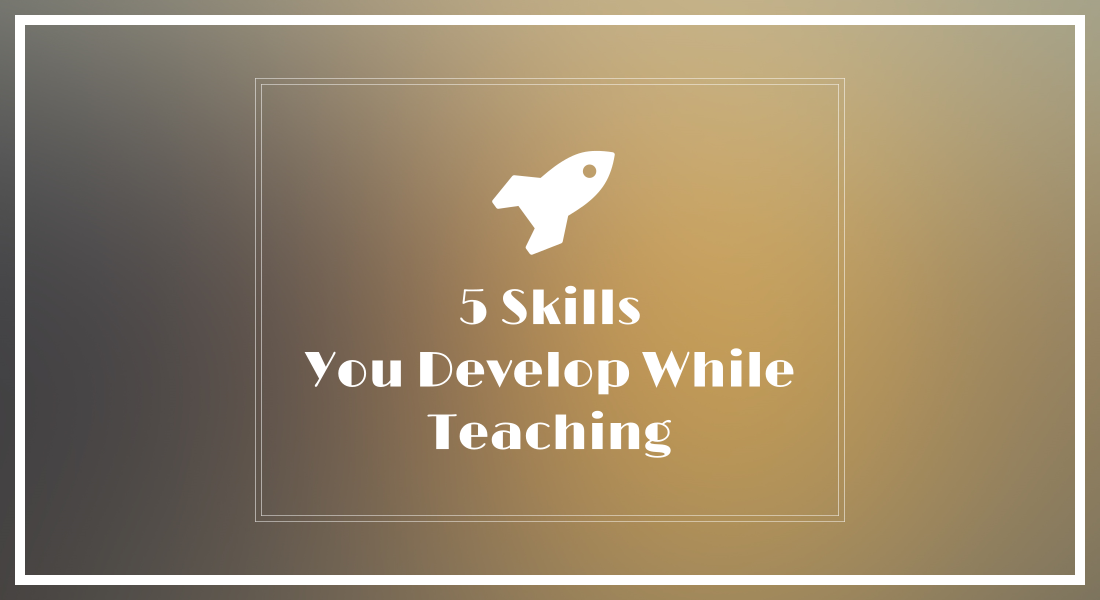
ConnectionsHow You Grow By Teaching
Not long ago, I wrote about some skills that can make it easy for entrepreneurs to take on volunteer and part-time teaching jobs [Read More]. Leadership skills, communication skills and resource management are a few of the ones I highlighted in that post.
Teaching also offers the opportunity to hone some skills that are in-demand across industries. Skills like Public speaking, Youth & People Management as well as Crisis Management are often tested by the diverse responsibilities that come with teaching. This is why the teaching environment is a good place to strengthen and deepen these skills. Life skills like Parenting can also be developed while on a teaching job.
These skills are part of the suite of competencies teachers need to truly excel at their jobs. I know this from experience. Late in 2013, I joined Nigeria’s Youth Corps programme and went on to teach at a Junior Secondary School for 18 months. It was a great experience but it was also very demanding. Being untrained as a teacher, it quickly became clear to me that much more than knowledge was required to succeed.
Teaching is like any other job in the sense that how well you perform will depend on how well you apply yourself to meeting the responsibilities of the job. The skills you bring to a job matter. But your ability to learn on the job probably matters more. This is true whether you work in the civil service or as an entrepreneur.
Through constant practice and trial-by-error, you will be able to consciously and unconsciously build certain transferrable skills while working as a teacher. To be clear, I cannot say that every teacher needs these skills. I am saying that these skills are needed and will enable you go above and beyond in meeting your teaching responsibilities.
Here are 5 skills you can build while working as a volunteer or part-time teacher.
Public Speaking
As a teacher, sometimes your responsibilities will be no different from that of a public speaker. While it is true that a roomful of junior or senior secondary students is hardly comparable to a room of your peers, a crowd is a crowd and it takes some skill to handle a crowd.
At times, you will have to be forceful and at times, persuasive. Sometimes, your role will be to facilitate conversation and at other times, it will be the exact opposite; to get your students to keep quiet. Sometimes, your purpose will be to raise the intellectual level of dialogue in the classrooom and at other times, you will need to keep things as simple as possible.
By forcing you to balance many responsibilities while in the classroom, teaching can help boost your ability to manage an audience or crowd.
People Skills
A teacher’s work does not end in the classroom. The skills that help teachers make a lasting positive impression on their students are honed and tested outside the classroom as well. For instance, a lot happens in staffrooms where students often go to have their questions answered one-on-one. Relating well with students, who though young and malleable already have distinct personalities, will certainly help you build your people management skills.
Learning how to relate with difficult students is also very important. Some young people can be very difficult. Even in situations where a student’s conduct is infuriating, a teacher cannot take license to do the unthinkable. There’s a limit to how friendly or how hostile a teacher can get with her students. Having good people skills means respecting these boundaries while relating appropriately with people be they children, young adults or grown ups.
Improvisation Skills
Teaching is one job where you will often need to improvise in order to solve problems. To improvise, you have to think on your feet and in the moment. Not every method, technique and tip is given in the subject syllabus. Sometimes, you have to figure it out for yourself in the moment. This can mean coming up with a unique teaching tool or technique. It may even mean drawing from your personal experience or from that of your students.
I had to improvise alot as an English Studies teacher. One notable example is when I had to find a quick way to teach my students about Rhyme Schemes in poetry. The problem was that they were being introduced to poetry and poetic devices in their last year of junior secondary school (just before their certificate exam). Bearing this in mind, I decided to begin my lesson on Rhyme Schemes using children’s rhymes instead of more complex poems from their textbook. We could be heard reciting ‘Twinkle, Twinkle little star’ and ‘I am a little teapot’. I’m sure we sounded ridiculous (‘Twinkle, Twinkle little star’ in JSS 3?) but it worked and the lesson stuck!
Crisis Management
While I was a teacher, there were days when it felt like I was moving from one crisis to another. Disciplinary cases would flow in from every direction and school responsibilities had to be handled alongside subject-teacher responsibilities.
Crisis management is an important life skill and a critical part of leadership. Being able to keep your cool, exercise sound judgement and maintain good performance is especially critical when there is a crisis at hand.
The teaching environment can be very hectic. While the issues that arise may seem trivial in hindsight, their effect is anything but. Crises can cause tension between staff and among students. They often demand significant time and energy to be resolved. And sometimes, these issues are recurrent. While having to work under such circumstances is far from ideal, it is often unavoidable. Navigating tough situations like these can help you build your mettle.
By mettle I’m not simply referring to your ability to handle stress. Dealing with these situations can help you develop skills for crisis and conflict resolution. By settling disputes among students, you teach your students about conflict resolution and you strengthen your ability to resolve conflicts. And by dealing appropriately with a colleague’s misconduct, you build your ability to confront issues head-on and ultimately, your ability to handle a crisis.
Organizational Skills
Without good organisation, schools cannot function and teachers cannot meet their responsibilities. Simple things like keeping to schedule matter so much. Teachers also have to complement the school’s timetable with their own plans. To teach efficiently, you will have to work out how to go about achieving your teaching goals in view of relevant factors.
Things like scarce and abundant resources, students’ knowledge & skills gaps, your own strengths as a teacher and the amount of time at your disposal should be taken into account. As you balance teaching with planning, scheduling and adjusting to new developments, you also strengthen your organizational skills.
Postscript
Nigeria recently activated a program to train and employ 500,000 teachers. As of this week, the N-Power Teach Program has received nearly as many online applications as the stated target number of teachers.
However, it is unclear to me the structure these teaching jobs will have. Will they accommodate part-time arrangements? How rigorous will the training be? Can previous teaching experience count towards training certification?
I hope effort is made to provide clarity on these and other points. The N-Power teach program is a great opportunity for many young people to acquire skills that are in-demand within and beyond the education sector. These are early days for the programme and like many Nigerians, I hope it will succeed.
I never pass up an opportunity to learn. It’s an attitude that has paid off. Seize every opportunity to learn and grow. If you find yourself at a school as a Corps Member, Part-time teacher, Volunteer, Teacher Trainee or Casual worker, remember that you have a golden opportunity to broaden your skills and competencies.
-
05Aug
12 Ways To Boost Your Self-Competence
Self-competence or personal competence refers to our ability as individuals to understand ourselves, direct our affairs, make decisions that are aligned with our values, and act effectively to achieve...
-
05Aug
5 Fresh Ways To Think About Positivity
Positivity is like a lens through which we see the world. It affects our experiences, our outlook and these in turn influence how we act. In this way, positivity (or the lack of it) also 'radiates' wi...





Sorry, the comment form is closed at this time.